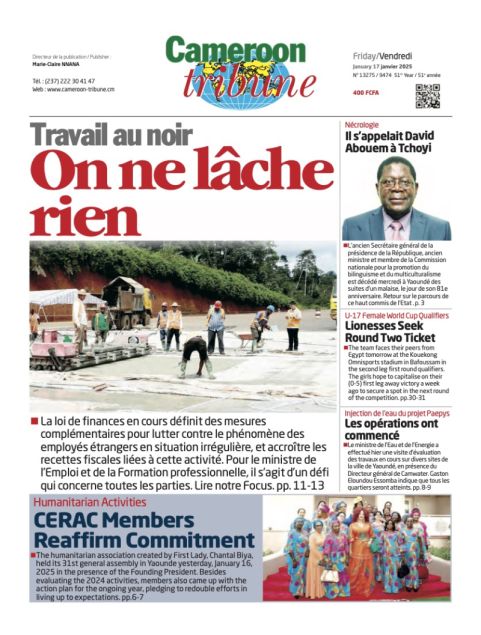Labour Recruitment: With Due Fairness, Dignity, Transparency……
- Par Kimeng Hilton
- 14 août 2023 11:46
- 0 Likes

UN Migration and the Ministry of Labour and Social Security on August 11, 2023 in Yaounde held a town hall meeting with stakeholders from the Centre and South Regions.
“Labour mobility is the trend today. You cannot stop migrants from crossing the borders. We want to ensure that the dignity of workers is respected,” commented Mrs. Mbouzie Ahanda Angelique Salomé epouse Abah, Head of Division for Standards and International Labour Cooperation in the Ministry of Labour and Social Security.
Labour Stakeholders’ Meet
She spoke in Yaounde on Friday, August 11, 2023 at the opening of a labour stakeholders’ workshop. Involving participants from the South and Centre Regions that was organized in partnership with the International Organization for Migration, IOM or UN Migration Cameroon office.
Labour Mobility, Conditions
The theme of the workshop was “Ethical recruitment, mobility of workers: Towards the quest for sustainable solutions for social justice in a context of free movement of persons.” The discussions with regional stakeholders (private sector employers, workers, trade unions) sought to define the mechanism for good practices on ethical recruitment, organizers said.
Ethics In Recruitment
“Certain jobs in Cameroon are the “preserve” of migrants from particular nations, which is demeaning because they are often paid poorly. Ethical employment protects workers against such abuses whether in Cameroon or in other nations. Ethical recruitment must become part of our labour practice,” Mrs. Abah insisted.
Disclosing that there about five million Cameroonian migrants abroad; while many also come to work in Cameroon. Thus, the need to regulate the market in accordance with the United Nations Sustainable Development Goal No. 8 on decent work, she explained.
African Union Agenda
Mbouzie Ahanda Angelique Salomé said as part of the African Union Agenda 2063, Cameroon was selected as the pilot country for the implementation of a programme on labour mobility. One of the main areas of the programme is improving labour mobility governance, which in general, is a great source of wealth creation and development.
Regulation As Necessity
“Migration has become so varied that if not regulated, there can be abuses of human rights. We see this everyday in our personal interactions and at work. The aim of ethical recruitment is to protect workers’ rights – be foreigners or nationals. As a host and sending country of migrants, Cameroon has in the past seen its nationals maltreated abroad and repatriated,” Mrs. Mbouzie recalled, sadly.
Respecting Rights
“For now, there are private recruitment agencies in Cameroon; while government also has one. We want to see where we have gone wrong in ethical employment. Cameroonian workers are in high demand abroad; reason why the criteria for ethical employment has to be clearly defined and made known to everyone. Our objective is to ensure that workers’ rights are respected,” Mrs. Mbouzie Ahanda Angelique Salomé restated.
Protection For People On The Move
According to Mrs. Tatiana Lobe, the Officer in charge of National Projects with the International Organization for Migration, IOM Cameroon, the workshop was part of a regional project involving West and Central African countries, aimed at protecting people on the move.
“We are concerned about workers who cross international borders in search of better living conditions. Cameroon organized four meetings with labour stakeholders from the regions during which workers’ conditions were reviewed - be they migrants or Cameroonians - who are employed through recruitment agencies,” Tatiana said. “We tried to find out what are the channels were used by migrant workers for employment; and if their rights were respected,” Lobe added.
Cameroon’s Pull Factors
Cameroon boasts abundant natural resources such as oil, wood, etc. These comparative advantages, developed since the colonial era, have continued to attract significant migratory flows not only from the Central African sub-region, but also from West Africa. Hosting a considerable number of migrants from neighbouring and other African countries, Cameroon has in recent decades also been sending out its most active and qualified population as immigrant workers to other lands.
Foreign Migrants In Cameroon
According to 2010 data from the Central Bureau of Censuses and Population Studies, BUCREP, the majority of migrants in Cameroon are from Nigeria (32.44 per cent) and countries of the Economic and Monetary Community of Central Africa, CEMAC (43 per cent).
It is however believed that these figures are largely underestimated as significant numbers of foreigners living in Cameroon are not officially declared, Minister Henri Eyébé Ayissi said in 2010. Migrants from other continents (Germany, China, the United States, France, Holla...
Cet article complet est réservé aux abonnés
Déjà abonné ? Identifiez-vous >
Accédez en illimité à Cameroon Tribune Digital à partir de 26250 FCFA
Je M'abonne1 minute suffit pour vous abonner à Cameroon Tribune Digital !
- Votre numéro spécial cameroon-tribune en version numérique
- Des encarts
- Des appels d'offres exclusives
- D'avant-première (accès 24h avant la publication)
- Des éditions consultables sur tous supports (smartphone, tablettes, PC)












Commentaires